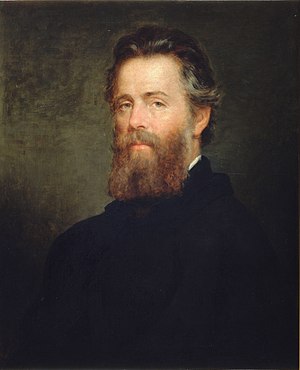
Next morning the not-yet-subsided sea rolled in long slow billows of mighty bulk, and striving in the Pequods gurgling track, pushed her on like giants palms outspread. The strong, unstaggering breeze abounded so, that sky and air seemed vast outbellying sails; the whole world boomed before the wind. Muffled in the full morning light, the invisible sun was only known by the spread intensity of his place; where his bayonet rays moved on in stacks. Emblazonings, as of crowned Babylonian kings and queens, reigned over everything. The sea was as a crucible of molten gold, that bubblingly leaps with light and heat.
Share this quote:
whenever my hypos get such an upper hand of me, that it requires a strong moral principle to prevent me from deliberately stepping into the street, and methodically knocking peoples hats off—then, I account it high time to get to sea as soon as I can.
Share this quote:
Woe to him whose good name is more to him than goodness
Share this quote:
Circumambulate the city of a dreamy Sabbath afternoon. Go from Corlears Hook to Coenties Slip, and from thence, by Whitehall, northward. What do you see?—Posted like silent sentinels all around the town, stand thousands upon thousands of mortal men fixed in ocean reveries. Some leaning against the spiles; some seated upon the pier-heads; some looking over the bulwarks glasses! of ships from China; some high aloft in the rigging, as if striving to get a still better seaward peep. But these are all landsmen; of week days pent up in lath and plaster— tied to counters, nailed to benches, clinched to desks. How then is this? Are the green fields gone?
Share this quote:
We cannot live only for ourselves. A thousand fibers connect us with our fellow men; and among those fibers, as sympathetic threads, our actions run as causes, and they come back to us as effects.
Share this quote:
They have provided a system which for terse comprehensiveness surpasses Justinians Pandects and the By-laws of the Chinese Society for the Suppression of Meddling with other Peoples Business.
Share this quote:
and yet a child’s utter innocence is but its blank ignorance, and the innocence more or less wanes as intelligence waxes.
Share this quote:
A whale ship was my Yale College and my Harvard.
Share this quote:
Now envy and antipathy, passions irreconcilable in reason, nevertheless in fact may spring conjoined like Chang and Eng in one birth. Is Envy then such a monster? Well, though many an arraigned mortal has in hopes of mitigated penalty pleaded guilty to horrible actions, did anybody ever seriously confess to envy? Something there is in it universally felt to be more shameful than even felonious crime. And not only does everybody disown it, but the better sort are inclined to incredulity when it is in earnest imputed to an intelligent man. But since its lodgement is in the heart and not the brain, no degree of intellect supplies a guarantee against it.
Share this quote:
...yet see how elastic our stiff prejudices grow when once love comes to bend them.
Share this quote:
Very often do the captains of such ships take those absent-minded young philosopher to task, upbraiding them with not feeling sufficient interest in the voyage; half-hinting that they are so helplessly lost to all honourable ambition, as that in their secret souls they would rather not see whales than otherwise. But all in vain; those young Platonists have a notion that their vision is imperfect; they are short-sighted; what us, then, to strain the visual nerve? They have left their opera glasses at home.
Share this quote:
He who has never failed somewhere that man cannot be great.
Share this quote:
We cannot live only for ourselves. A thousand fibers connect us with our fellow men.
Share this quote:
He offered a prayer so deeply devout that he seemed kneeling and praying at the bottom of the sea.
Share this quote:
From without no wonderful effect is wrought within ourselves unless some interior responding wonder meets it.
Share this quote:
Aye, aye, it must be so. Ive oversailed him. How, got the start? Aye, hes chasing ME now; not I, HIM--thats bad
Share this quote:
Hope is the struggle of the soul, breaking loose from what is perishable, and attesting her eternity.
Share this quote:
To know how to grow old is the master work of wisdom, and one of the most difficult chapters in the great art of living.
Share this quote:
Is there some principal of nature which states that we never know the quality of what we have until it is gone?
Share this quote:
Let America first praise mediocrity even, in her children, before she praises... the best excellence in the children of any other land.
Share this quote: